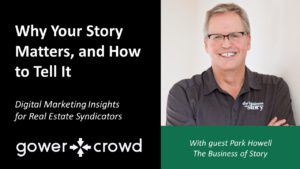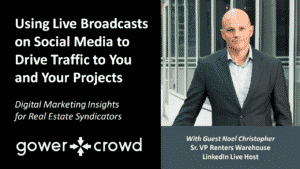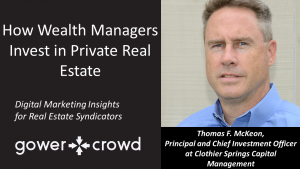Geoffrey Dohrmann, Executive Chairman, CEO & Editor-in-Chief, IREI
How to master communications with institutional real estate investors
 Geoffrey Dohrmann, Executive Chairman & CEO, IREI
Geoffrey Dohrmann, Executive Chairman & CEO, IREI
The story you are going to hear from my guest today is of the evolution of mass communications with a singular focus on real estate, specifically oriented to institutional investors.
From producing a monthly journal on paper, to the migration to digital media, Geoff Dohrmann has seen it all. He talks about how real estate was a minor sideshow for investments by institutional capital when he started 30+ years ago and how it now represents a significant proportion of the market.
And, importantly, that maybe real estate crowdfunding is on the same growth trajectory and why – listen for his insights into how to predict the future by keeping an eye on the peripheries.
What You're Going to Learn
- Definition of an Institution
- Creating an Effective Asset Mix Works
- Early Days of Institutional Investing
- The Growth of Institutional Investing
- Today’s Institutional Investors are Craving Information
- Staying on Top of Challenges in the Business
- Entrepreneurial Success Formula
- Ultimate Measure of Success
- The Future of Crowdfunding
- My Best Advice for Entrepreneurs
Related article: The Ultimate Guide to Crowdfunding Real Estate Development
Listen To or Watch the Full Podcast Here
Show Highlights
FOR REAL ESTATE DEVELOPERS
THE WHITE BOARD WORKSHOP
Learn the exact system best of class sponsors use to raise money online.
Definition of an Institution
Adam: What is an institutional or what is an institution in your world, what defines that?
Geoff: An institution is an organization that is geared to manage money for the benefit of third parties. At least that's how we define an institutional investor. So that could be a life company, that could be another form of insurance. It could be a pension fund. It could be a real estate investment trust. It could be an endowment, a foundation, a sovereign wealth fund, a family office, a professionally organized family office. Anywhere where you have investment professionals managing money for the benefit of third parties, that is an institutional investor type relationship.
Creating an Effective Asset Mix Works
Geoff: The principle behind it really comes from the work of Markowitz many years ago in Modern Portfolio Theory, the idea that if you spread your assets and mix your assets across the spectrum of risks, that overall you'll get a better overall performance no matter what the economic scenario might be.
So this whole idea of asset allocation, driving investment decision making process is really what it's all about. And they try to create an asset mix that operates along what they call an efficient frontier. It's a line on a chart that will operate optimally depending on what kind of environment, because nobody knows for sure what's coming. Could be hyperinflation, could be stagflation. It could be low inflation, as we've had for so many years, could be high interest rates and inflation, could be high interest and high in any number of different things.
What's going to perform the best? And so they used these models, very sophisticated models to figure that asset allocation and they assume that more of the return will come from the way in which they mix up the assets, then from the individual performance of any individual manager or any individual asset class. So there's a lot of adherence to this and what a CIO will be doing throughout the whole process is rebalancing. So unless the equities outperform what their expectation was, but real estate underperforms.
Well, you're not going to put more into equities. They're going to actually reduce their equity exposure and increase their real estate exposure to rebalance the portfolio to come into line with the asset allocation model. Sounds nuts when you hear it on the surface, but if you understood the mathematics behind it, you understand why it works. It just works.
Early Days of Institutional Investing
Geoff: When I first started my business, I really patterned it after and modeled it after a business that was built by a young American stock exchange analyst named Gilbert Kaplan, who started a magazine called Institutional Investor Magazine. And it has won numerous awards over the years, it's been sold a number of times, but his thesis when he started that in 1966 was that the ownership of assets in America and around the globe was shifting from the hands of individuals into the hands of institutions. Capital was being aggregated. There are professional asset managers.
At the time what he meant by an institutional investor was a mutual fund. Right? And also it was a world where increasingly during the time that he started it up was shifting towards an independent money management mod. So the institutional investors didn't have the ability to build out huge staffs to manage their money, so they hired third party investment managers, professionals to manage that for them.
So now all of a sudden, what they needed to monitor was what was going on in that world. Who are the good guys, and who are the not so good guys. And who was outperforming. And what were the issues you had to think about? What kinds of investment managers, all this all these kind of issues which weren't what traditional investment publications were covering. So he created a new kind of information. So what I saw happening in 1987 when I started was that the same thing was happening in real estate that had happened, you know, 30 years, 20 years earlier.
The Growth of Institutional Investing
Adam: So what was it that created what I'm assuming was like that hockey puck hockey stick growth for you? What drove that?
Geoff: There was all sorts of things that happened and all of them mostly external to our business. The first thing that happened was that actually before we started our business was the mutual fund meltdown in 1974, and I was still in college at the time that that happened. Wasn't even aware it occurred. But we just gone through an energy crisis and the mutual fund market melted down, and so did the real estate investment trust market. Both of them melted.
And people were looking for alternatives, so what happened out of that was that institutions turned from mutual funds as their primary source of managing money to specialists - money managers. And at the same time, real estate investment managers had started in 1971/72 when the Prudential Insurance Company of America - started what was called CRRSAA, which was the first open ended fund which was a real estate investment vehicle designed by an actuary, Danny Meyer Melnikoff, to make it possible for institutions to pool their money and invest in real estate.
Similar to the way they were pooling their money in mutual funds. Then in 1984, the Tax Act hit - The Economic Recovery Tax Act of 1984 and that restructured things that introduced accelerated depreciation. And it also removed the barriers for savings and loans and other types of thrift oriented institutions to get into lending on commercial real estate assets, which they've never been allowed to do before. They were originally chartered just to fund savings and loans. So that started an explosion of real estate syndication for individual investors and real estate investment by institutions.
Today’s Institutional Investors are Craving Information
Adam: Well, so, Geoff, what do these - what is the value they derive from, what is your mission? And what was it then and how has that evolved and what is it today?
Geoff: Our mission has always been to be the most reliable source of information on the institutionalization of the asset classes and to help improve transparency, reduce costs in the business and to break down the barriers to enable good solid communication in the business. So those, that's been part of our mission since the very, very beginning. And notice I didn't say to be the first to get information out. Institutions move very slowly and they move very methodically, and they have to really be careful in their underwriting of due diligence to make sure that they're making their moves correctly. So getting news first has never been important. Getting news RIGHT is really important.
Staying on Top of Challenges in the Business
Adam: And what have been the biggest as a media company, what have been the biggest challenges for you over the years as the industry has grown?
Geoff: Well, first of all, keeping track with our audience because it's changed over time. When it first started, real estate was considered to be office and really only CBD trophy office in major cities, industrial and really only warehouse distribution properties and retail and really only regional markets. People would say I'd never invest in anything with beds, so apartments are out, hotels were out, senior housing was out, student housing was out. None of those things.
Today, all of those things are part of it. So we've had to expand as we've gone along. The other thing is the structure of the investments has changed. When we first started, everybody was investing through group trusts because of the risk. Now everybody's investing in a million different structures in the middle of it all. As I mentioned when we were chatting earlier, we shifted from a paper based production process to desktop publishing. And then right when we thought we finally figured that out isn't that great.
The internet came along and all of a sudden completely undercut the value of the information we were providing 30 days later, it had to be provided on a daily basis. So we had to shift our platform from being primarily print based to being digital first. There's no publisher on earth that hasn't made this transition or they fail. And then you've got to figure out, how do you monetize that? Because people's appetite for information on the internet is limited to what they can get for free.
Most people are somewhat reluctant to pay for it. And so we had to find a way to monetize that at the time. So lots of different things that have happened over time. We tried a million different things that didn't work. I think I'm telling the story of most entrepreneurs.
Entrepreneurial Success Formula
Adam: Looking back on your career and where you are today, what have been the. If you were to start again monetizing what would be the best methods for doing that? Cut all the failed efforts, the pathway to success? What are the best ways?
Geoff: Well, I think the formula that we've settled upon works. It depends on what your goals are. To me, the first goal has to be create something that's going to be of service to humanity of some kind. Either a narrow niche, or broad. But if you don't have passion for being of service, I don't think you're going to have much success in business.
As long as you're going to be doing that, you might ask two other questions. The first question is what's financeable? What will people lend money or invest in? The second thing is, how scalable is it? Can it scale? Because your ability to track capital is to be directly related to the ability to scale the business.
And the second question is the most difficult to answer correctly because you have a tendency to want to believe your own B.S. and over inflate what you really can deliver over time. It's kind of called the optimism bias by scientists like Daniel Kahneman and others that have done work in this area. We all tend to be too optimistic. We think we accomplish more with fewer resources than we need in faster time than we're actually going to be able to do it. So all of those things really are important. And you also have to ask yourself, Can I manage? And that's a big, really different kind of thing most entrepreneurs can't. They're driven by the wrong things, and you've got to absolutely adore people and you absolutely have to have no ego and you've got to be able to put all the light on the people that are working for you and take the light completely off yourself. Not everybody's wired to do that.
Ultimate Measure of Success
Adam: So how do you measure success? These are very interesting ideas, you measure success through the increase in the number of subscribers or the increase in the number of sponsors or an email from somebody saying,"that was great, thank you". Like, how do you measure success?
Geoff: Well, we measure success like every business does. Consider sales, the bottom line, but it's never been the driver for us. I think when people come up to me and say, "you really need a difference in the business, you've introduced humanity into a business that's often cold and dark, and you have really filled an information gap and made it easier for us to do the things that we do on a daily basis". That's part of how we measure success.
The Future of Crowdfunding
Adam: Your name came up, somebody contacted me and I asked them if they had a question. I mentioned your name. They said, Well, you know, it's Geoff Dohrmann, you should look into Geoff. And I asked them if they had a question for you, and they do. He wants to know if you think there is a future for allocator funds now that everyone can go direct to great real estate sponsors without double promoting through crowdfunding.
Geoff: Give me in a timeframe. You know, I think allocator funds are going to be around for quite a while. I don't think they're going to go away. I think that crowdfunding for institutional investors is what I would call on the periphery. You know, the future is what's going on in the periphery. You need to keep your other eye on that as you're rebuilding the maps and you need to build maps that incorporate these new technologies into them. We ain't seen nothing yet. We don't even know what crowdfunding is going to look like. You and others like you will be reinventing the future for all of us, and you'll do it the same way I did. Trying a million things that don't work quite as well as the way you want them to do.
My Best Advice for Entrepreneurs
Adam: What are the daily habits that you have that make you successful?
Geoff: When I need to be successful and need to focus, time blocking is essential. If you don't say I'm going to do this activity at this particular time, it always tends to get away from you. And what you need to time block are the things that you really normally would avoid doing. Talking to your people every day to the extent that you can is really important. Communication can blow a business up like you can't even believe. And then talking to your clients on a frequent basis.
Adam: Hardest lesson you've learned in business or in real estate?
Geoff: Don't ever, ever, ever compromise your values. If you allow somebody in your organization that does not share your values, you will spend so much time - it doesn't matter how productive. What I find in life is you learn everything at deeper and deeper layers, like peeling back an onion. And you go, Oh, I got it! And the universe goes, really try this on for size! And you have to learn it just a little deeper. So that's a life lesson for me. It's all about character. And if you're dealing with people of character, it doesn't matter what the contract says, they're going to do the right thing. And if you're dealing with the wrong kind of people, it also doesn't matter what the contract says because they'll hire lawyers and find a way to get around the contract and put it to. So, you know, that would be my advice.
Geoff: And I think what's interesting about entrepreneurship, is that there are far more entrepreneurs who are really creating value and creating new products and new areas and new ways of doing things. They'll be more like my business than Bill Gates or Steve Jobs or the guys that get the headlines. For every one of those, there's thousands of us, and what we're going to create is a good business. Maybe some wealth for ourselves, maybe some wealth for our investors, but it's not something an angel investor or a venture capitalists would be the least bit interested in, because they're not scalable businesses. They're not going to get up to the multibillion dollar business. They might to get to be 20 or 30 million dollar businesses. And so it's interesting the things that I've gone through, the things that every entrepreneur.
A guide for remote workers
How to Setup a TV Studio Quality Home Office















